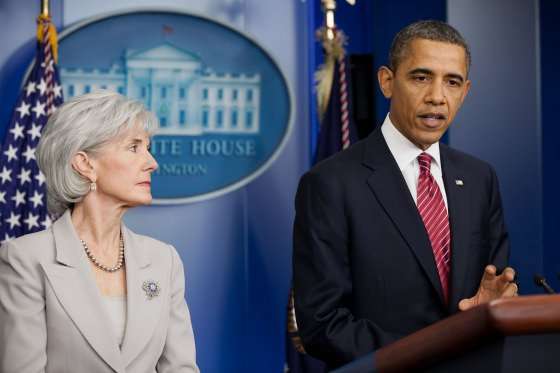Is HHS Secretary Sebelius's Solicitation of Private Industry Support for Obamacare Illegal, or Merely Unethical?

Is President Obama's top health official violating federal regulations by asking health industry executives to kick in money to support the implementation of Obamacare?
Last week, The Washington Post reported that Health and Human Services Secretary Kathleen Sebelius had "gone, hat in hand, to health industry officials, asking them to make large financial donations to help with the effort to implement President Obama's landmark health-care law." According to the Post, an HHS source and an industry official have affirmed that over the last three months, "Sebelius has made multiple phone calls to health industry executives, community organizations and church groups and asked that they contribute whatever they can to nonprofit groups that are working to enroll uninsured Americans and increase awareness of the law."
Over the weekend, The New York Times reported that two organizations expected to be supporting the law are The Robert Wood Johnson Foundation, which is expected to give $10 million, and H&R Block, which will give a "donation" of $500,000. The Post and the Times reports also indicate that Secretary Sebelius has made contact with insurers, asking them to support the health law's implementation.
Is this legal? Here's the Post on the relevant rules:
Federal regulations do not allow department officials to fundraise in their professional capacity. They do, however, allow Cabinet members to solicit donations as private citizens "if you do not solicit funds from a subordinate or from someone who has or seeks business with the Department, and you do not use your official title," according to Justice Department regulation.
Does the insurance industry, which is heavily regulated by Obamacare, count? You might think so. But a flack for Sebelius tells the Post that the answer is no, not technically, because Sebelius did not explicitly ask for financial donations. Instead, "[HHS spokesperson Jason] said that Sebelius did not solicit for funds directly from industries that HHS regulates, such as insurance companies and hospitals, but rather asked them to contribute in whatever way they can."
That's not how the insurers understood it it. An "industry official who had knowledge of the calls but did not participate directly in them said there was a clear insinuation by the administration that the insurers should give financially to the nonprofits," according to the Post. Something like this, perhaps? Hey, we're short on money here. It would be nice if you could help with whatever you can, hint-hint, nudge-nudge.
Or maybe just: Hey, insurers. We just passed a law mandating that everyone in the country buy your product. So how about a million bucks? Or even a couple million? Over the weekend The New York Times reported that, according to an insurance industry executive, "some insurers had been asked for $1 million donations, and that 'bigger companies have been asked for a lot more.'" That sounds rather like there was a direct solicitation.
So is Sebelius violating the relevant regulations? We'll know more soon enough. Sen. Lamar Alexander, the top Republican on the Senate Health Committee, is expected to ask the Government Accountability Office to look into the matter.
It wouldn't be the first time Sebelius had violated federal guidelines.
Last year, the U.S. Office of Special Counsel concluded that she had violated the Hatch Act, which restricts political activity by executive branch office holders, by billing and labeling a political speech as official travel.
Nor, as Cato Institute Health Policy Director Michael Cannon points out, would it be the first time that Sebelius used her position to, ah…encourage insurers to get with the program:
Shortly after ObamaCare became law, insurers began telling their customers how much it was going to increase their premiums. In a September 2010 letter to insurers, Sebelius shot back that premiums would rise no more than 2 percent, even as her department predicted increases as high as 7 percent. Insurers that didn't toe the party line "may be excluded from health insurance Exchanges in 2014." That was no idle threat, I wrote at the time. Since "Medicare's chief actuary predicts that in the future, 'essentially all' Americans will get their health insurance through those exchanges," Sebelius was essentially threatening to put insurers out of business if they disagreed with her.
Even if Sebelius has not technically broken the law, there's something distinctly unsavory about her fundraising pitches. As Meredith McGehee, policy director for the Campaign Legal Center, told the Post last week, "It sounds like the people she's going to are people that are being regulated by her agency, I think that is definitely problematic. That's not a statement about the value of the law, but it's a statement about using the power of government to compel giving or insinuate that giving is going to be looked at favorably by the government."


Show Comments (26)